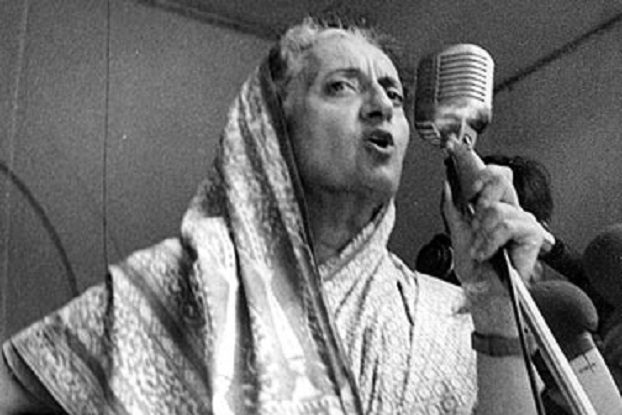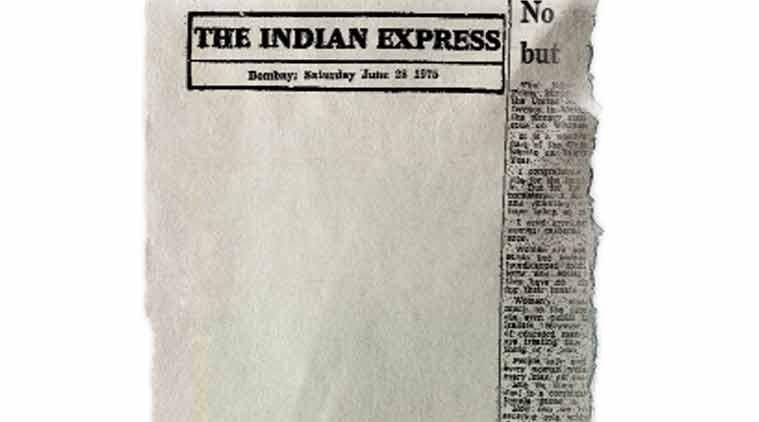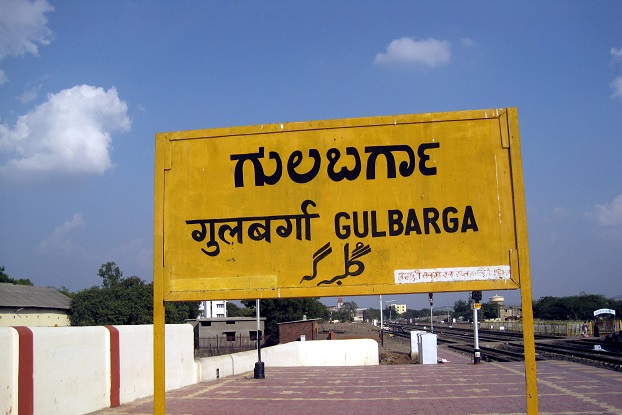When the general elections of 1977 were announced, my father, an itinerant civil engineer with the Public Works Department, was in his third transfer in five years, posted to a remote corner of South India. His itinerancy was helped by his unwillingness to be corrupt in the most lucrative of the government departments. Every time he stood up to a corrupt boss or reprimanded an underling selling hardware on the black market, he would be shunted to barren outposts, devoid of political significance and lucrative irrigation projects. He had neither money nor the political connections to overcome the transfers, but he was proud of his values. “Values don’t buy food for your family,” my mother told him.
His colleagues were extravagant in their corruption, advising him in vain, “The trough is in front of you and you are thirsty. Listen…All you need to do is drink.”
In 1977, when we were transferred to a desolate little village in the Gulbarga district with summer temperatures reaching the mid-120s, it was as if my father had been exiled for committing a political crime. People routinely paid bribes to their superiors not to be posted to these parts — ironic considering my father’s situation.
Even though we didn’t get rich from my father’s job, being banished to bleak places brought its own riches. We lived the high life with our pick of government servants while we occupied inspection bungalows from British colonial times. It never occurred to me that people could be rich while working for the government. In my mind, rich people just sat on sumptuous white cushions in their shops and dealt in money, grains or jewelry.
The place of our exile stood at the confluence of three small tributaries to the river Bhima, the lifeblood of agriculture in those parts. The tributaries were reduced to trickles in the absence of rains and made agriculture completely dependent on monsoons. A project that would dam these waters had been in the making for a decade by the time my father took over.
The election brought my father additional responsibilities. Being a Gazetted Officer (which to me meant that he signed all the official documents, including school report cards in the official green ink), my father was responsible for overseeing polling stations across the five villages in the northern-most part of the district. This job came with enormous political pressure and no additional pay. The election also brought out the political junkie in my father.
“The election also brought out the political junkie in my father.”
For the whole month preceding the election and weeks after it, he ignored his family, like an Englishman during football season. Friends came over almost every night, ostensibly to discuss politics. They stayed back for extended dinners, consuming copious amounts of coffee and to my mother’s dismay, stronger potions. He had always been a teetotaler. It’s the Brahmin way, he would tell us, although we weren’t Brahmins. It was another reason he didn’t fit in with the public works department, where liquor flowed copiously than an undammed river in summer.
But he tolerated Dr. Deshmukh, the affable government village doctor, and Mr Sindhagi the junior collector, smuggling in their bottles. Drinking spiced up their contribution to the discussions, which grew heated and more animated as night rolled on. My mother showed them what she thought of that by putting out aluminum cups for them to use. These were the same cups that were used by servants. Chagrined, my father persuaded her to buy some proper drinking glasses which she kept near the bathroom, never allowing them into the kitchen. My father had never washed dishes in his life but he washed the alcohol stained glasses before she woke up in the morning, his penance for participating in the sins of his friends.
When he was not fighting political battles at our home, Dr. Deshmukh was a much wanted man in the surrounding villages where Tuberculosis (TB) and leprosy were rampant. This was an era when TB was still a romantic disease, unlike leprosy with its physical deformities. TB was often inflicted on a hapless hero of a Bollywood movie when it became clear that he was the expendable part of a three-way love triangle. Although a cure was available — and we were reminded of that constantly in public service announcements in big letters moving across the silver screen whenever the TB affected hero spat out blood — deaths from the disease were commonplace.
1977 was a watershed year in Indian politics, a recalibration point for the country and its people of a certain generation, for India had precipitously come close to being a dictatorship, when the prime minister had set aside the founding democratic principles of the country and ruled by decree.

Indira Gandhi, elected in 1971 as the Prime Minister had been challenged in the courts by her political opponents for misusing state machinery to win the election. Four years later, in 1975, the plodding Indian judicial system finally ruled against her, invalidating her victory over a technicality. She had refused to give up power and declared a state of emergency, jailing all her political opponents and reporters, muzzling a vibrant free press for nearly two years. But in 1977, as suddenly as she had instituted the emergency, she reversed it, calling for general elections, after an ill-fated internal polling indicated a landslide win for her party.
At home, each night, I heard heated arguments between my father and his friends peppered with English words. The political loyalties were divided between friends. Mr Deshmukh, was a staunch supporter of Indira Gandhi,while Mr Sindhagi threw in his lot with the opposition parties. My father hovered in the middle, mediating, prodding the participants to intense political discussions.
“Why have elections? It’s a farce. For sure, we know that she will be back in power. I predict complete voter-fraud”, Mr. Sindhagi shook his head in despair.
Dr Deshmukh, a dashing young man, was more concerned about how others perceived India:
“You know what is farcical? Our judicial system. They are laughing at us all over the world. In America they wrote in their newspapers ‘Indians fire their Prime Minister over a traffic ticket’.
Sindhagi, listen to me, your opposition party buffoons will cause a hung-parliament”
Mr Sindhagi: “My father fought for this country and went to jail! Beaten viciously by the British for their patriotism. Now she acts like the daughter of the British queen. Putting our people in jail!? The British may have left but their progeny still rule this country.”
Mr. Sindhagi had benefited mightily from the so-called “freedom-fighter’s” quota, using the jail certificate of his father’s incarceration during the British Raj to get a junior collector’s job in the Indian Administrative Services. As a minor bureaucrat, he basked in the long lines of people waiting every day for his “darshan” (a word used for appearance of gods to bless their worshippers), reprising the role of feudal lords from the time of the Raj. The British had left but their bureaucratic progeny still ruled the country.
“The British had left but their bureaucratic progeny still ruled the country.”
My father was the ever practical one and tried to be conciliatory, “Listen Sindhagi… I am somehow beginning to like this dictatorship. Buses are on time, the contractors who supply cement to the irrigation project haven’t missed deliveries. It is usually this or that reason, ‘my lorry broke down sir’, ‘my driver is sick sir’. I am so tired of them. Now everything is ekdum perfect. Let me tell you, poor people will benefit from this progress.”
Seeing my father favoring Dr. Deshmukh’s side, Mr. Sindhagi softened his stance, “I support efficient government, don’t get me wrong, but when she put opposition party people in Jail, that I didn’t like.”
“Don’t forget Sindhagi, public disruption in these sensitive times comes with a price. Let them spend some time eating adulterated rice and watery daal in the jail. They will be back on track,” said Dr. Deshmukh.
“I am just hoping that when they come into power, the opposition parties don’t do tit-for-tat baba. That will be really bad for the Congress party supporters.” Mr Sindhagi issued a veiled threat.
Dr. Deshmukh was unfazed and scoffed at even the notion of anyone else but Indira winning the election, “Forget forming a government, they won’t win. I will put that in writing. I will go so far as to predict that they will lose their deposit, every last one of them.”
The major paper editorials had protested censorship by printing blank columns and “blank” was also the operative word behind Indira’s son Sanjay’s approach to curb the skyrocketing population. He had instituted a forced mass sterilization program, known as nasbandhi in the vernacular, which became a rallying cry for the opposition parties to get the common people behind them. The common people were doing just fine without jobs or food, but when their ability to have children was taken away, that they didn’t like.

This was fantastic theater for a young brain. I disobeyed the bedtime curfews and eavesdropped on the conversations. I tried to piece together various exotic English terms and their meanings. Words like horse trading, hung parliament or deposit loss made no sense on their own but I liked the way they sounded.
When I pestered my father for answers, he simply ignored me. My mother looked at me as if I had been drinking from the glasses by the bathroom. It was not that she was not interested in politics, but setting up the household anew every couple of years left her with no time for anything else. Just when she became comfortable with the lay of the land, established a rapport with the maids and figured out a way to exterminate the predominant local household pest, my father would have managed to anger a superior and a move would be imminent.
Recently the political discussion group had found an audience. Mada, the housekeeper of the Inspection bungalow we lived in, had been staying late, spreading his towel on the floor by the living room chairs and nodding his head to the discussion like he was listening to the all-night recitation of the Ramayana at the village temple. My father was glad to off-load the glass washing responsibility to him. Dr. Deshmukh in particular was fond of Mada, offering a bit of something he was drinking which Mada gratefully accepted in his aluminum cup.
Mada was a wiry man of unknowable age; his parents had no official record of his birth. He used that to his advantage, producing every few years, documents from various hospitals and temples to backtrack his birthdate. This was an effort to avoid the mandatory retirement age of 55 as much as possible. He fluffed up his hair in an effort to look youthful and tried to hide his grays by the liberal use of henna, which only ended up making him look like he was on fire.
“Mada, who had cast his ballot with the party that supplied him with most free booze, declared war on anyone who was after his vas deferens.”
Like his birthday, his political affiliations were fluid. When asked, “Mada, who are you voting for”? He would respond without irony “who do you want me to vote for saheb?” To the political party agents milling outside polling places, he was cryptic: “arre? Who do you think I voted for”? In the face of their skepticism, he would rattle off the purported serial number of his ballot, challenging them to verify it when one of them went in to witness the vote counting that evening. He often went missing for days before the elections at the country liquor shop, whose rumor mill clearly informed his politics. And now thanks to Mr. Sindhagi’s conspiratorial rhetoric, he was convinced that the goal of the emergency government was to neuter the male population of India, particularly the poor ones. Mada, who had cast his ballot with the party that supplied him with most free booze, declared war on anyone who was after his vas deferens.
“God has many children in my future amma“, he told my mother.
This was a man who had already fathered three children from two women and struggled to put food on their plate. If anybody benefitted from Sanjay Gandhi’s population control plan, it was Mada. However, his two wives adored him and not even the sight of two fingers in the right hand atrophied by leprosy lessened their affection for him. Jealous types speculated that the promise of his early demise and the lure of lifelong government pension to the next of kin kept those women close to him. Vicious types speculated that the women felt safe with a man who couldn’t grip a stick firmly enough to beat them.
As children, my sister and I were a little repulsed by his hands but soon overcame it and invented cruel jokes to tease him, as children do, like asking him to count to ten on his fingers. He took in stride and responded by grabbing a shrieking child and using an extra hand to do the math. My sister, blessed with well-arched feet always escaped his clutches.
Mada served as an impartial observer never taking sides openly and the trio looked to him for validation of their political views. After all, he was the common man, and the elections would affect him more than government employees of repute. He just grinned at them and said, “what do I know saheb? I didn’t even pass tenth,” referring to the school leaving certificate exam. But when pressed, he held forth with gusto, offering responses using an alternative history of India, constructing rosy scenarios in which people martyred in the cause of freedom were alive and ruled the country. This endeared him to Mr. Sindhagi who was still seething at the Nehru-Gandhi family’s dynastical ruling.
When I saw him going head-to-head with my father and their friends, I knew I had found my teacher. Mada already wore many hats: caretaker of the bungalow, procurer of groceries, babysitter of the engineer’s children, fixer of the British era water boiler and now my political guru.
* * * Read the rest of Aman Sen’s “Elections in India: A Memoir” here.* *
An engineer by training but a writer at heart, Aman runs his own company and lives in Brookline, Massachusetts. This essay is a piece of memoir he wrote as part of an ongoing collection for his daughter. India as she knows it through annual visits is far different from the one he grew up in, and he hopes that a collection of these vignettes serves as a field guide for her to understand her father.













